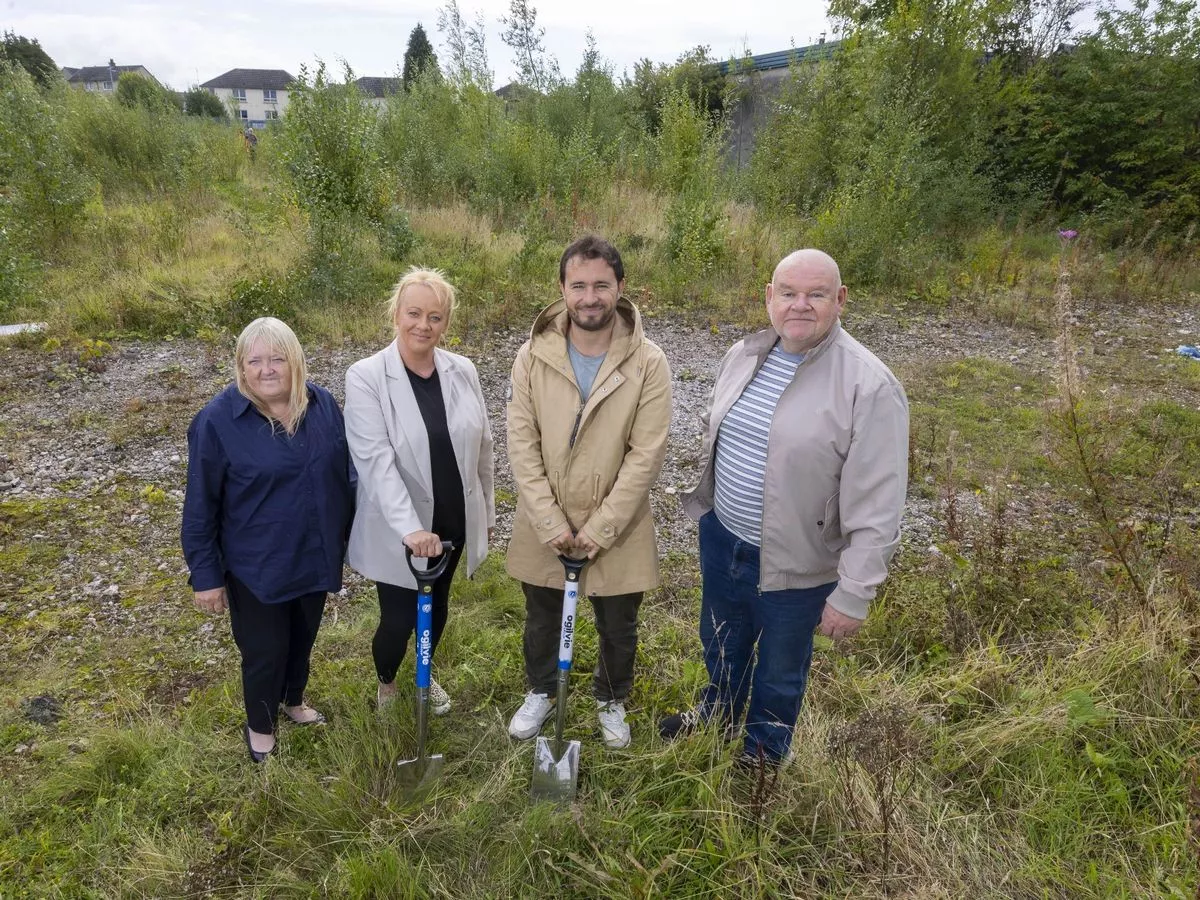By Robert Mitchell
Copyright dailyrecord

Construction is now underway on a new homelessness village, delivered in partnership between South Lanarkshire Council and Social Bite. Following community consultation, the project on Harriet Street in Rutherglen has been named Harriet Gardens, celebrating the area’s local heritage and reflecting the village’s welcoming landscaped design. Chair and Depute Chair of South Lanarkshire Council’s Housing and Technical Resources Committee, Councillors Davie McLachlan and Margaret Cowie, visited the site with Josh Littlejohn MBE, founder of Social Bite, and Karen Good, contract manager at The Salvation Army, to mark the start of the work which will transform the unused land into a village of safe, sustainable homes for people affected by homelessness. The £3m project, which was unanimously approved by councillors last year, will be built on the former Westfield Saw Mills site and features 15 modular Nest Houses, manufactured by Scottish firm Ecosystems Technologies. At the heart of the village will be a community hub, offering shared spaces for cooking, group activities, therapeutic support and social connection. The development is designed to provide a supportive and nurturing environment, helping residents on their journey out of homelessness. Charity partner, The Salvation Army, has been appointed to manage the day-to-day running of Harriet Gardens and deliver specialist, round-the-clock support. As one of the UK’s leading providers of homelessness services, they will offer practical care to help residents stabilise their lives, develop skills, access employment and transition successfully to independent housing. Their involvement ensures that Harriet Gardens combines secure accommodation with a supportive community environment, giving residents the tools they need for long-term success. By combining high-quality living spaces with intensive onsite support and working with local partners, residents will have opportunities to develop skills and secure employment, with the ultimate goal of going on to sustain their own tenancy in permanent accommodation. Harriet Gardens builds on the successful model of Social Bite’s Edinburgh Village, which has helped more than 100 people who have experienced homelessness transition successfully into their own homes, reconnect with family and build strong connections with their local communities. Councillor McLachlan said: “South Lanarkshire has a strong track record in delivering high-quality housing and homelessness services. Our position as a top-performing local authority is built on innovative thinking and robust partnerships. We welcome the investment and expertise of Social Bite and its partners, alongside a long-term partner in Salvation Army, as we continue to expand and enhance our services to meet the diverse needs of homeless households.” Josh Littlejohn said: “The Harriet Gardens project, in partnership with South Lanarkshire Council and The Salvation Army, will serve as a vital resource to help residents on their journey from homelessness to independent living and break the cycle of homelessness for good. “Following four successful community consultation sessions and the approval of planning permission from South Lanarkshire Council’s planning committee, it’s great to see this project taking shape. With homelessness on the rise – including a 17 per cent increase in rough sleeping and record numbers of households in temporary accommodation – there has never been a more urgent need for alternatives that combine quality housing with the right support. “It’s brilliant to have The Salvation Army on board, bringing their experience and expertise to help residents build skills, confidence, and stability. I’m hugely grateful to all our partners and supporters and look forward to seeing Harriet Gardens come to life and welcome its first residents.” Helen Murdoch, assistant director of strategic operations and development (Scotland), with The Salvation Army said: “At The Salvation Army we understand supporting people to move from rough sleeping to independent living requires a holistic approach. This means working alongside individuals to build practical life skills such as budgeting, managing a home and looking after themselves, while nurturing relationships and support networks. “We take time to explore each person’s hopes, dreams and aspirations for the future – which may include training, education or employment – placing the individual at the centre of everything we do. We’re looking forward to offering welcoming, honest and compassionate support to the Harriet Street village as we prepare for our first residents.” The sustainable modular homes, known as Nest Houses, will include a unit for staff and be manufactured by Scottish proptech company Ecosystems Technologies. Each pod contains a bedroom, shower room, kitchen and a lounge space. The community hub will have cooking, welfare and laundry facilities and will provide a central area where residents can meet. The site extends to approximately 0.4 hectares and it slopes gently northwards from Wallace Street down to Fairie Street and is enclosed by a combination of a 2m high metal fence and a brick boundary wall. Replicating the existing model of Social Bite’s Village in Edinburgh, it will provide a beautiful living environment and intensive onsite support. Big windows in the homes will bring in sunlight, and leafy pathways will link residents to the community hub and peaceful outdoor spots. The community hub at the heart of the village will serve as a central gathering place. Equipped with a communal kitchen, recreational areas, counselling rooms, outdoor decking, and exercise facilities, it will host activities focused on personal growth, training, and recovery services. There will be an active weekly timetable including opportunities ranging from yoga, running and bike rides, to a cooking club and DJ sessions. Social Bite anticipate community members in South Lanarkshire will live at the village for approximately six to 12 months, though this will depend on individual needs. Over this time, people will contribute to the life of the community, have opportunities to learn a range of new skills, and engage in work and voluntary placements, giving them the opportunities to build an independent life, secure stable employment and sustain future tenancies. At the end of their time at the village, residents will be supported in transitioning to permanent accommodation and employment. A total of 61 representations were received by the council for the project – 55 objections and five letters of support. The objections included concerns over pedestrian and road safety, loss of property value for residents living nearby and anti-social behaviour. *Don’t miss the latest headlines from around Lanarkshire. Sign up to our newsletters here . And did you know Lanarkshire Live had its own app? Download yours for free here .



